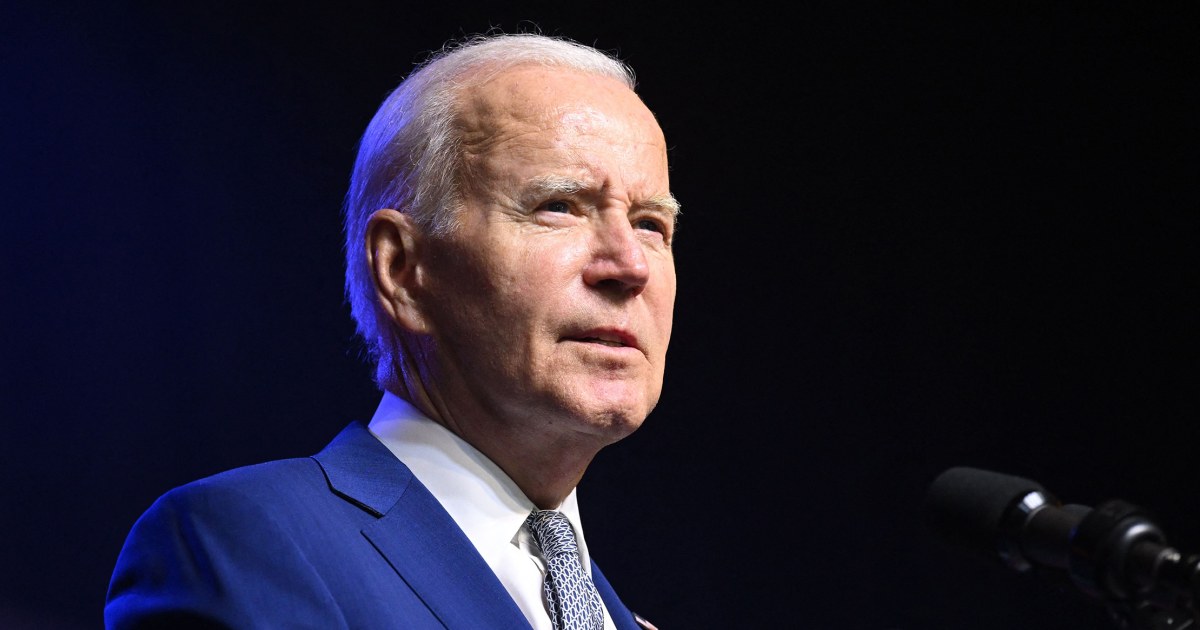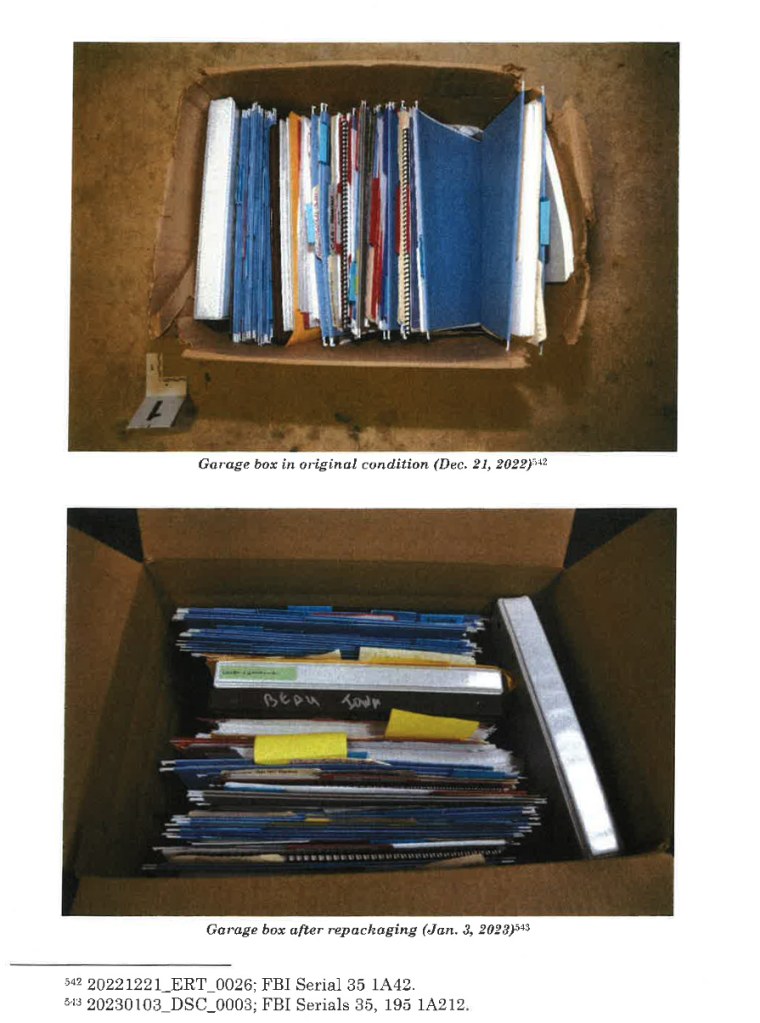
WASHINGTON — Special counsel Robert Hur has declined to prosecute President Joe Biden for his handling of classified documents, but said Biden’s practices “present serious risks to national security” and added that Biden portrayed himself as an “elderly man with a poor memory” who would be sympathetic to a jury.
“Our investigation uncovered evidence that President Biden willfully retained and disclosed classified materials after his vice presidency when he was a private citizen,” the report said, but added that the evidence “does not establish Mr. Biden’s guilt beyond a reasonable doubt.”
Biden said Thursday he was “pleased to see they reached the conclusion I believed all along they would reach — that there would be no charges brought in this case and the matter is now closed,” adding that he “cooperated completely, threw up no roadblocks, and sought no delays.”
Hur’s report included several shocking lines about Biden’s memory, which the report said “was significantly limited” during his 2023 interviews with the special counsel. Biden’s age and presentation would make it more difficult to convince a jury beyond a reasonable doubt that the now-81-year-old was guilty of willfully committing a crime.
“We have also considered that, at trial, Mr. Biden would likely present himself to a jury, as he did during our interview of him, as a sympathetic, well-meaning, elderly man with a poor memory,” it said. “Based on our direct interactions with and observations of him, he is someone for whom many jurors will want to identify reasonable doubt. It would be difficult to convince a jury that they should convict him — by then a former president well into his eighties — of a serious felony that requires a mental state of willfulness.”
Later in the report, the special counsel said that the president’s memory was “worse” during an interview with him than it was in recorded conversations from 2017.
“He did not remember when he was vice president, forgetting on the first day of the interview when his term ended (‘if it was 2013 — when did I stop being Vice President?’), and forgetting on the second day of the interview when his term began (‘in 2009, am I still Vice President?’),” the report said.
Biden also had difficulty remembering the timing of his son Beau’s death, as well as a debate about Afghanistan.
“He did not remember, even within several years, when his son Beau died,” the report said.
Defenders of the president quickly pointed out that he sat for the interview in the days after Hamas’ Oct. 7 attack on Israel. Biden, giving previously scheduled remarks on Thursday, appeared to nod to that, saying, “I was in the middle of handling an international crisis.”
He also added that he was “especially pleased” that the special counsel “made clear the stark differences between this case and Donald Trump.”
In a Monday letter to Hur and his deputy special counsel, Richard Sauber and Bob Bauer, Biden’s personal counsel, disputed how the report characterized the president’s memory.
“We do not believe that the report’s treatment of President Biden’s memory is accurate or appropriate,” Sauber and Bauer wrote in the letter, which was also released on Thursday. “The report uses highly prejudicial language to describe a commonplace occurrence among witnesses: a lack of recall of years-old events.”
Separately, Sauber responded to the report by saying the White House is “pleased” it has concluded and that there were no criminal charges.
“As the Special Counsel report recognizes, the President fully cooperated from day one,” he said in a statement. “His team promptly self-reported the classified documents that were found to ensure that these documents were immediately returned to the government because the President knows that’s where they belong.”
Sauber went on to appear to criticize the report but raised no specific points.
“We disagree with a number of inaccurate and inappropriate comments in the Special Counsel’s report,” Sauber said in his statement. “Nonetheless, the most important decision the Special Counsel made — that no charges are warranted — is firmly based on the facts and evidence.”
Hur’s report said there were “clear” material distinctions between a potential case against Biden and the pending case against Trump, noting that unlike “the evidence involving Mr. Biden, the allegations set forth in the indictment of Mr. Trump, if proven, would present serious aggravating facts.”

Most notably, the report said, “after being given multiple chances to return classified documents and avoid prosecution, Mr. Trump allegedly did the opposite.” In contrast, it said, “Mr. Biden turned in classified documents to the National Archives and the Department of Justice, consented to the search of multiple locations including his homes, sat for a voluntary interview, and in other ways cooperated with the investigation.”
Hur’s report does explain at length where the facts of the Biden investigation are similar to the charges brought against Trump.
“For all of the classified materials recovered during this investigation, after the vice presidency, Mr. Biden did not receive a written waiver of the need-to-know requirement, and no agency official made the findings required by the executive order,” the report states.
Some of the report focuses on documents about Afghanistan, from early in Barack Obama’s presidency. About a month after Biden left office as vice president, in a recorded conversation with his ghostwriter in February 2017, Biden remarked that he “just found all this classified stuff downstairs,” the report said. He told him, “Some of this may be classified, so be careful,” in one recording. Biden was believed to have been referencing classified documents about the Afghanistan troop surge in 2009, which Biden opposed.
The announcement tops off a lengthy saga that began in November 2022, after one of Biden’s personal attorneys found classified documents that appeared to be from the Obama administration at the Penn Biden Center for Diplomacy and Global Engagement, which Biden had used as a personal office after his vice presidential term concluded. Classified documents were later also found at Biden’s Delaware home.
The existence of classified documents at Biden’s home and former office were first reported in January 2023. CBS News first reported the existence of the documents at the Penn Biden Center.
Attorney General Merrick Garland in January 2023 announced that he would appoint Hur as special counsel to oversee the investigation into Biden, saying the appointment authorized him “to investigate whether any person or entity violated the law in connection with this matter.”
Biden was interviewed in October as part of the investigation, the White House said. The interview was voluntary, according to White House spokesman Ian Sams.
“As we have said from the beginning, the President and the White House are cooperating with this investigation, and as it has been appropriate, we have provided relevant updates publicly, being as transparent as we can consistent with protecting and preserving the integrity of the investigation,” Sams said at the time.
NBC News has also previously reported that the special counsel had interviewed Hunter Biden as well, according to a source familiar with the matter.
With Hur’s announcement, Donald Trump remains the only president in history to face criminal charges, which include seven criminal charges in connection with mishandling classified documents found at Mar-a-Lago. According to the indictment in that case, Trump had more than 100 classified documents at his Florida home, including documents with “Top Secret” classification markings.